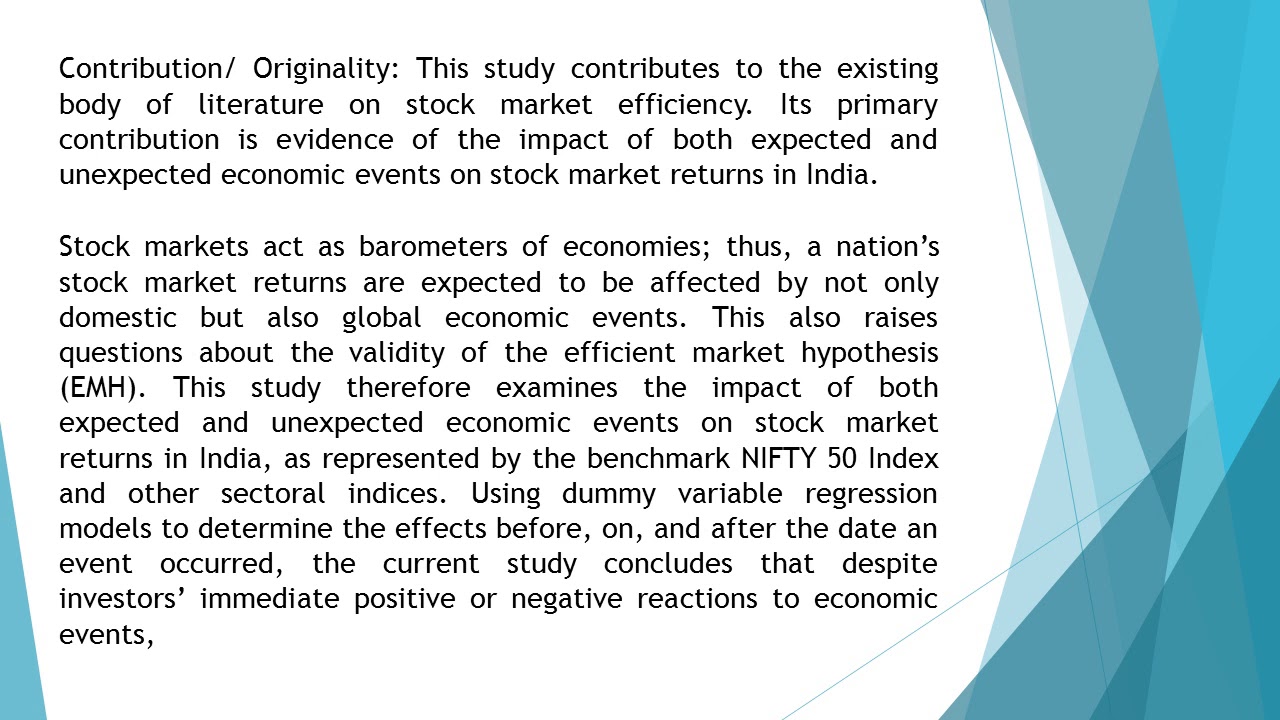Market Reactions to Major Economic Events

- Understanding the Impact of Major Economic Events on Stock Markets
- Analyzing Market Volatility in Response to Economic News
- Investor Sentiment and Market Reactions to Economic Data Releases
- The Role of Central Banks in Shaping Market Responses to Economic Events
- Strategies for Navigating Market Turbulence During Economic Uncertainty
- Case Studies: How Major Economic Events Have Shaped Market Trends
Understanding the Impact of Major Economic Events on Stock Markets
When it comes to understanding the impact of major economic events on stock markets, it is crucial to analyze how different factors can influence market reactions. These events can range from changes in interest rates to geopolitical tensions, and each one can have a significant effect on stock prices.
One key factor to consider is how economic data releases can impact stock markets. For example, positive employment numbers can lead to a rise in stock prices as investors anticipate increased consumer spending. On the other hand, negative data such as a decrease in manufacturing output can cause stock prices to fall as investors worry about the state of the economy.
Another important consideration is how central bank decisions can affect stock markets. For instance, if a central bank decides to raise interest rates, this can lead to a decrease in stock prices as borrowing becomes more expensive for companies. Conversely, a decision to lower interest rates can boost stock prices as companies can borrow money at lower costs.
Geopolitical events also play a significant role in influencing stock markets. For example, tensions between countries can lead to market volatility as investors become more risk-averse. On the other hand, positive developments such as trade agreements can boost stock prices as investors gain confidence in the market.
Overall, it is essential for investors to stay informed about major economic events and understand how they can impact stock markets. By analyzing these events and their potential effects, investors can make more informed decisions about their investments and navigate the ever-changing landscape of the stock market.
Analyzing Market Volatility in Response to Economic News
Market volatility in response to economic news is a common phenomenon that can have a significant impact on financial markets. When major economic events are announced, such as changes in interest rates or GDP growth figures, investors often react swiftly to new information. This can lead to sharp fluctuations in stock prices, currency values, and commodity prices.
One way to analyze market volatility in response to economic news is to look at historical data and identify patterns or trends. By studying how markets have reacted to similar events in the past, analysts can gain insights into how they might behave in the future. This can help investors make more informed decisions about when to buy or sell assets.
Another approach is to use mathematical models to predict how markets will respond to economic news. These models take into account factors such as market sentiment, trading volume, and the nature of the news itself to forecast how prices are likely to move. While no model can predict market movements with certainty, they can provide valuable guidance to investors.
Overall, understanding how markets react to major economic events is crucial for anyone involved in trading or investing. By staying informed about the latest news and trends, investors can position themselves to take advantage of opportunities and minimize risks in an ever-changing financial landscape.
Investor Sentiment and Market Reactions to Economic Data Releases
Investors’ sentiment and reactions to economic data releases play a crucial role in shaping market movements. When key economic indicators are released, such as employment reports or GDP figures, investors closely analyze the data to gauge the health of the economy. **Market participants** often react swiftly to this information, adjusting their investment strategies based on their interpretation of the data.
**Investor sentiment** can have a significant impact on market volatility. Positive economic data releases can boost investor confidence, leading to an increase in buying activity and driving stock prices higher. Conversely, negative data can spark fear and uncertainty, causing investors to sell off their holdings and driving prices lower.
It is essential for investors to stay informed about upcoming economic data releases and understand how these reports can influence market sentiment. By staying ahead of the curve and anticipating market reactions, investors can position themselves to capitalize on opportunities and mitigate risks in a rapidly changing market environment.
Overall, investor sentiment and market reactions to economic data releases are key drivers of market dynamics. By closely monitoring these factors and staying informed about the latest economic developments, investors can make more informed decisions and navigate the markets with greater confidence.
The Role of Central Banks in Shaping Market Responses to Economic Events
Central banks play a crucial role in shaping market responses to major economic events. These institutions have the power to influence interest rates, money supply, and overall financial stability. By adjusting monetary policy, central banks can help mitigate the impact of economic shocks and steer markets in a certain direction.
One key tool that central banks use to shape market responses is through interest rate adjustments. By raising or lowering interest rates, central banks can influence borrowing costs, consumer spending, and investment decisions. This, in turn, can impact asset prices, exchange rates, and overall market sentiment.
In addition to interest rates, central banks also have the ability to intervene in financial markets directly. For example, during times of extreme volatility or crisis, central banks may engage in open market operations to stabilize markets. By buying or selling government securities, central banks can inject liquidity into the financial system or remove excess funds to prevent inflation.
Furthermore, central banks often communicate their policy decisions through public statements, press conferences, and speeches. These communications are carefully crafted to provide guidance to market participants and shape expectations. By managing market expectations, central banks can influence investor behavior and market reactions to economic events.
Overall, central banks play a critical role in shaping market responses to economic events. Through interest rate adjustments, direct interventions, and effective communication, central banks can help maintain financial stability and steer markets in the desired direction. Their actions have far-reaching implications for asset prices, exchange rates, and overall market dynamics.
Strategies for Navigating Market Turbulence During Economic Uncertainty
In times of economic uncertainty, it is crucial for investors to have **strategies** in place to navigate market turbulence effectively. Here are some **tips** to help you weather the storm and make informed decisions during periods of volatility:
1. **Diversification**: One of the most important **strategies** for managing risk in turbulent markets is diversifying your portfolio. By spreading your investments across different asset classes, industries, and geographic regions, you can reduce the impact of any single event on your overall **portfolio**.
2. **Stay Informed**: Keeping up to date with the latest economic news and market trends is essential for making informed decisions. By staying informed, you can anticipate potential **market** movements and adjust your **investment** strategy accordingly.
3. **Focus on the Long Term**: During times of market turbulence, it can be tempting to make **impulsive** decisions based on short-term **fluctuations**. However, it is important to focus on your long-term **investment** goals and avoid making knee-jerk reactions to **market** volatility.
4. **Seek Professional Advice**: If you are unsure about how to navigate market turbulence, consider seeking advice from a **financial** advisor or **investment** professional. They can help you develop a **strategy** that aligns with your **financial** goals and risk tolerance.
5. **Monitor Your Portfolio**: Regularly reviewing and monitoring your **portfolio** is essential during times of economic uncertainty. By keeping a close eye on your **investments**, you can identify any potential risks or opportunities and make adjustments as needed.
By following these **strategies**, you can navigate market turbulence with confidence and make informed decisions that align with your long-term **investment** goals. Remember to stay calm, stay informed, and stay focused on the big picture.
Case Studies: How Major Economic Events Have Shaped Market Trends
Examining case studies can provide valuable insights into how major economic events have influenced market trends over time. By analyzing past occurrences, we can better understand the potential impact of current and future events on financial markets.
- One notable case study is the 2008 financial crisis, which was triggered by the collapse of the housing market in the United States. This event led to a global recession, with stock markets experiencing significant declines and volatility. Investors lost confidence in the financial system, leading to a flight to safety assets such as gold and government bonds.
- Another case study is the dot-com bubble of the late 1990s, where excessive speculation in technology stocks led to a market crash. This event highlighted the dangers of investing in overvalued assets and the importance of conducting thorough research before making investment decisions.
- More recently, the COVID-19 pandemic in 2020 caused widespread market disruptions as countries implemented lockdowns to curb the spread of the virus. Stock markets experienced sharp declines, while sectors such as healthcare and technology outperformed due to increased demand for their products and services.
These case studies demonstrate the interconnectedness of major economic events and market trends. By learning from the past, investors can better prepare for future uncertainties and make informed decisions to protect their portfolios.



